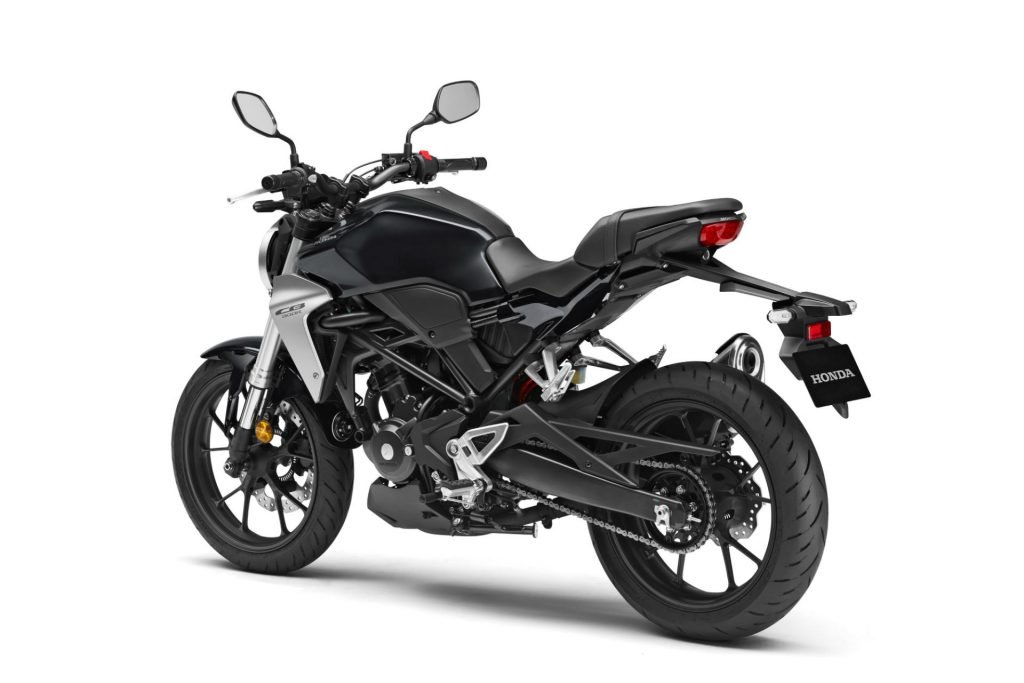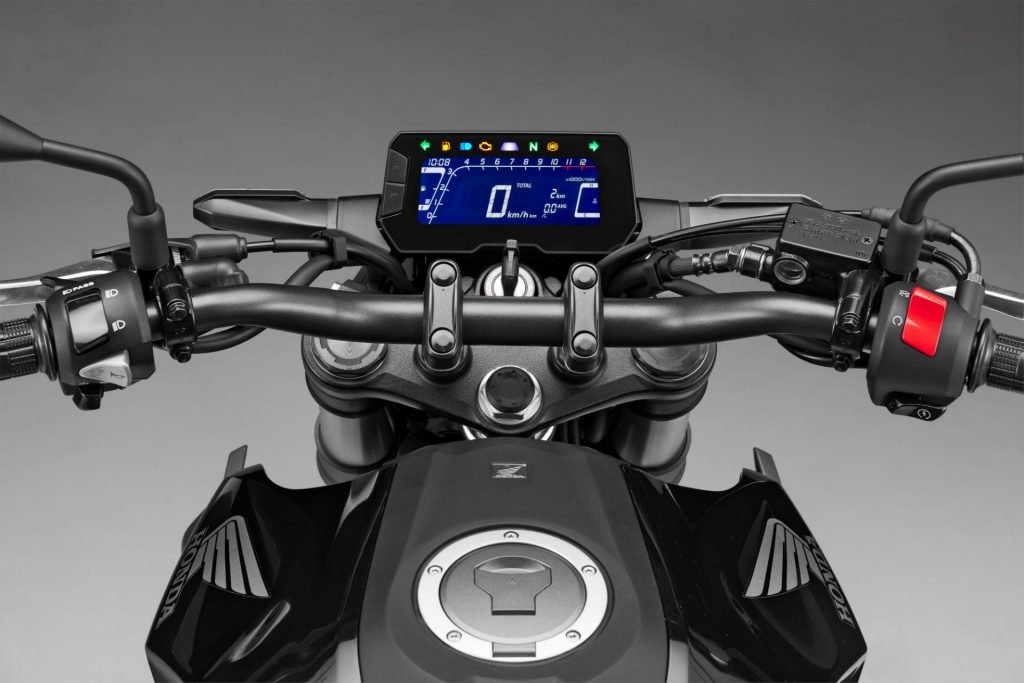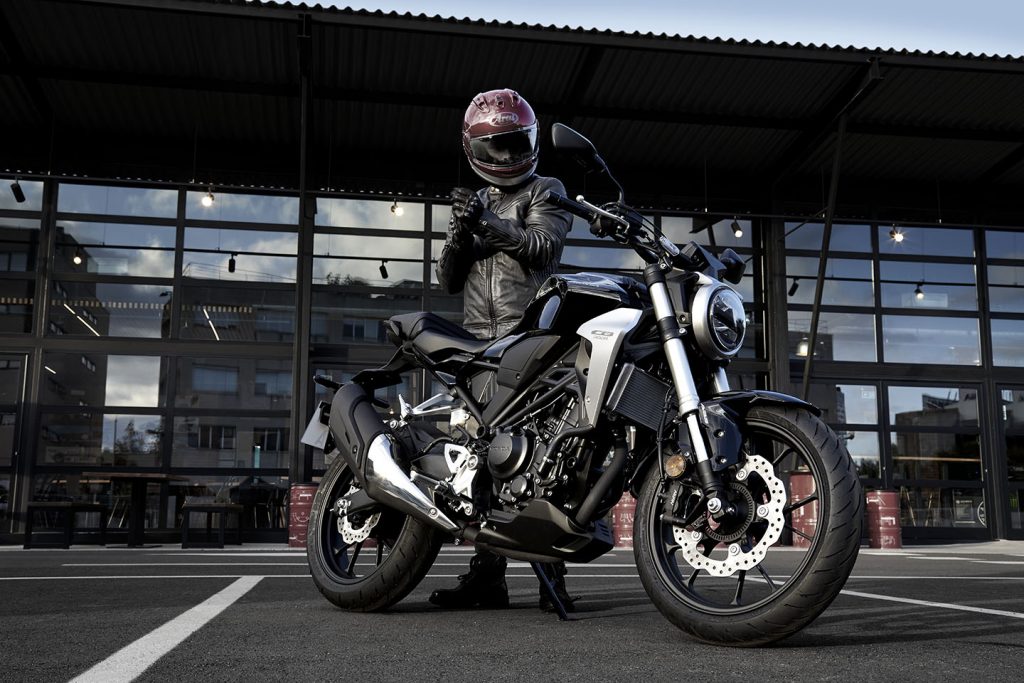Honda presented the 2018 model of the CB300R
Honda presented during EICMA 2017, the 2018 Honda CB300R. Now, it has a new style called “Neo Sports Café” by Honda.
See below, the full press release with details and specs of this naked bike:
1. Introduction
Honda has a new presence in its line-up for 2018: the CB300R. Part of a new ‘sport naked’ family – which includes the CB1000R and CB125R – it distills all of the excitement of two wheels into a distinctively-styled, lightweight form.
Representing a major stepping-stone for any young or new rider, the CB300R is very much a first ‘big’ bike after a 125cc machine, offering impressive and engaging sensations from both engine and chassis without the weight, cost and licence implications of a larger capacity motorcycle. It’s the ideal machine for newer riders to develop their riding skills and enjoyment, and is also a great introduction to Honda, with the brand’s engineering prowess, design philosophy and high build quality firmly on display.

Fun to ride, a joy to own and representing a bold new direction for smaller displacement machines, the CB300R has many of the premium features found on its larger capacity siblings. It also injects a fresh new style on to Europe’s city streets, with its ‘Neo Sports Café’ minimalist, bare-boned attitude shared with both its 1000 and 125cc stablemates.
2. Model Overview
Subtracting weight – the CB300R tips the scales at just 143kg wet – gains Honda’s new lightweight star a performance advantage. And mix in a free-revving 286cc liquid-cooled single cylinder engine, plus a unique new style and presence, and the CB300R’s intention to excite and inspire young riders is clear to see.
A brand new frame mixes pressed and tubular steel for a tuned rigidity balance that gives great feedback. The CB300R also features 41mm USD forks with radial-mount 4-piston caliper, hubless floating front disc, IMU-based ABS and Dunlop radial tyres.
Valuable features more usually found on much larger machines such as the tapered rubber-mounted aluminium handlebar, LCD instrument display and full LED lighting, exude quality and add to the pride of ownership.
3. Key Features
3.1 Chassis & Styling
Industrial minimal styling takes cues from the 2018 CB1000R
- Lightweight frame mixes tubular and pressed steel
- 41mm USD front forks and irregular-cross section steel swingarm
- Radial-mount 4-piston caliper and hubless 296mm floating front disc
- Full LED lighting and LCD instrumentation
- IMU-based ABS
The CB300R’s frame – which helps underpin its minimalist style, drawn on the same Neo Sports Café lines as the new 2018 CB1000R – is constructed with tubular and pressed steel; the swingarm is manufactured from steel plate, irregularly shaped in cross-section. Both are designed to achieve high longitudinal rigidity and control torsion from wheel deflection without excess rigidity or weight.

The chassis’ core strength is anchored by the pressed steel swingarm pivot plates and swingarm, allowing the tubular steel lattice frame to deliver agile handling with stability and feedback. The 41mm USD forks also complement the CB300R’s handling, with compliant damping and supple spring rate.
The single rear shock offers 5-step spring preload adjustment. A 49.6% front/50.4% rear weight bias provides a positive feel for front-end grip and easy steering which is also helped by the low, 143kg wet weight and compact 1352mm wheelbase.
The aluminium fat bar-style handlebars turn through a 40° radius and the 2.3m turning radius guarantees easy passage in jammed city traffic. Seat height is 799mm.
The front 296mm hubless floating disc is worked by a radial-mount Nissin 4-piston caliper; the rear 220mm disc a single piston caliper. Both are modulated by 2-channel ABS. The high specification system works through an IMU (Inertial Measurement Unit) to give precise front to rear distribution of ABS operation depending on the vehicle behaviour The 150/60R-17 Dunlop radial rear tyre is matched to a 110/70R-17 radial front.
Styling is a deliberate reduction, putting the machine’s blacked-out hardware on display. It’s also brutally neat and brings a new hard-edged attitude to the naked bike scene. The cutaway tail unit is barely there, and supports separate rider and pillion seats plus the nylon rear mudguard mount. Both rider and pillion footpeg hangers are aluminium.
A thin (23.5mm) lightweight (230g) full function LCD instrument display provides speed, engine rpm, fuel level and gear position simply, with warning lights arrayed across the top. Full LED lighting – including indicators – adds a premium feel and contributes to mass centralisation. The headlight uses a dual bar light signature, upper for low beam and lower for high beam and the taillight is the thinnest ever mounted on a Honda motorcycle.
The 10L fuel cell is hidden underneath an angular cover and shrouds and houses an aircraft-style filler cap. With fuel economy of 30.2km/l (WMTC mode), the CB300R can cover over 300km from full.

3.2 Engine
- Responsive single-cylinder DOHC 4-valve engine
- 23.1kW peak power/27.5Nm peak torque
- Underslung side-exit exhaust
- 6-speed gearbox
The CB300R’s compact 286cc DOHC 4-valve liquid-cooled single cylinder engine – shared with the CBR300R – is a diminutive jewel that has won many fans for its free-revving and responsive nature. And while that free-spinning character can get the adrenaline pumping as revs rise, it’s also an engine that works well in ‘real-world’ road riding conditions, both around town and out on the highway.
Peak power of 23.1kW arrives @ 8,500rpm, with peak torque of 27.5Nm delivered @ 7,500rpm. The 6-speed gearbox offers an even spread of gears for strong acceleration – the CB300R will cover 0-200m in just 9.2s
Bore and stroke is set at 76 x 63mm, with compression ratio of 10.7:1. PGM-FI fuel injection – with 38mm throttle bore and straight-shot intake path – delivers crisp throttle response across the rev range. The exhaust is underslung and exits on the right side through a dual-chamber muffler.
To reduce maintenance costs – an important factor for younger riders – the engine is also designed with the minimum number of moving parts. Details like the low-friction piston rings, high-density core radiator and iridium spark plug help increase fuel efficiency.
4. Technical Specifications
| ENGINE | |
| Type | Liquid-cooled single cylinder |
| Engine Displacement (cm³) | 286cc |
| Bore and Stroke (mm) | 76mm x 63mm |
| Compression Ratio | 10.7:1 |
| Max. Power Output | 23.1kw/8500rpm |
| Max. Torque | 27.5Nm/7,500rpm |
| Oil Capacity | 1.8L/1.5L |
| FUEL SYSTEM | |
| Carburation | PGM-FI |
| Fuel Tank Capacity | 10.0L |
| Fuel consumption | 30.2km/litre |
| ELECTRICAL SYSTEM | |
| Starter | Electric |
| Battery Capacity | 12V-7AH |
| ACG Output | 318W |
| DRIVETRAIN | |
| Clutch Type | Wet, multiplate hydraulic clutch |
| Transmission Type | 6-speed |
| Final Drive | Chain |
| FRAME | |
| Type | Steel diamond frame |
| CHASSIS | |
| Dimensions (LxWxH) | 2012mm x 802mm x 1052mm |
| Wheelbase | 1352mm |
| Caster Angle | 24º |
| Seat Height | 799mm |
| Ground Clearance | 151mm |
| Kerb Weight | 143kg |
| Turning radius | 2.3m |
| SUSPENSION | |
| Type Front | 41mm telescopic fork, 130mm stroke |
| Type Rear | Monoshock damper, Pro-Link swingarm, 107mm travel |
| WHEELS | |
| Rim Size Front | 17inch |
| Rim Size Rear | 17inch |
| Tyres Front | 110/70R17M/C 54H |
| Tyres Rear | 150/60R17M/C 65H |
| BRAKES | |
| ABS System Type | 2 channel with IMU |
| Front | 296mm hubless floating disc with radial-mount Nissin 4-piston caliper |
| Rear | 220mm disc with single piston caliper |

